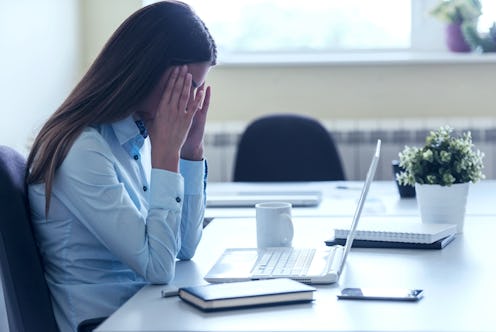If you've never been subject to the unending misery of a migraine, you are lucky indeed. While tension and caffeine headaches can be unpleasant, migraines are physically and mentally debilitating, often confining sufferers to quiet, dark spaces until the pain stops, which could take anywhere from hours to a number of days. Though there are prescription drugs available that can help mitigate migraines, some people find homeopathic remedies also help ease the pain—like, for instance, this essential oil migraine stick, which one BuzzFeed writer swears is the only thing that brings her back to life.
Indeed, according to BuzzFeed staff writer Katy Herman, the Migrastil Migraine Stick has managed to spare her some serious headache suffering — not just migraines, but tension headaches, sinus headaches, hormonal headaches, you name it. Her doctor wanted her to cut back on Ibuprofen "rebound headaches," which, annoyingly, are headaches you get when you take medication to, um, stop headaches, so she tried this stick, which is basically a tiny portable mass of essential oils that you can rub on your neck and forehead when the throbbing starts.
"The stick provides a pleasant, cool, tingling feeling, almost like VapoRub," Herman writes for BuzzFeed. "It lessens the intensity of the pain, and, if my headache is dull or just starting, it can make it go away almost entirely. If nothing else, it at least extends how long I can go without taking ibuprofen and delays the splitting headache I sometimes feel coming after a long day."
Herman's recommendation certainly sounds useful, but if you're also regularly punished by migraines, the stick might not work for you. Dr. Susan Hutchinson, Headache Specialist and Medical Advisor at MigraineX, (which produces pressure-fighting earplugs for migraine sufferers), says to Bustle that one of the big problems with migraines is that what works for some people might not work for others. "Sometimes it's a process for someone with migraines to work with their healthcare provider to see what will work for them," Hutchinson tells Bustle.
Migraines are basically symptomatic of a very sensitive nervous system, and whether or not you're susceptible to them is genetic, according to the Migraine Research Center. People who get migraines tend to be more sensitive than others to bright lights, drops in barometric pressure, certain fragrances, and changes in hormones (like right before you get your period), and when they come on, they're more of an episodic attack than a headache. But certain people are affected but certain triggers, and others aren't, which can make treating or preventing a migraine very difficult. "I suggest keeping a paper or electronic diary so you can track what your triggers are," Hutchinson says to Bustle. "That way you can start looking at patterns. Do you get a migraine every time there is a change in weather? Every time your period starts? Every time you have Chinese food with MSG? Then, you can be more specific with your treatment."
Some non-drug migraine-combatting methods Hutchinson suggests include using cooling ice packs, barometric pressure-reducing products like the aforementioned MigraineX earplugs, and essential oils, or aromatherapy like Herman's preferred Migrasil Migraine Stick. But Hutchinson cautions people against purchasing certain scents without knowing whether or not they're a trigger. "We have some essential oils in our office. Some people like dabbing a little lavender. Other people say they can't do that," Hutchinson says to Bustle. "With essential oils, it's very individual. A person has to try to see, is it going to help? Is it going to hurt? But it's worth trying those things, because they're so easy and non-pharmacologic."
So, once you know your triggers, you can do your best to avoid them, and keep your preferred migraine-combating method on hand in case you can't. Other ways to keep migraines at bay include getting enough sleep, eating plenty of protein, and exercising. "These are basic things for everyone, but having healthy lifestyle is even extra important for people who get migraines," says Hutchinson to Bustle.
